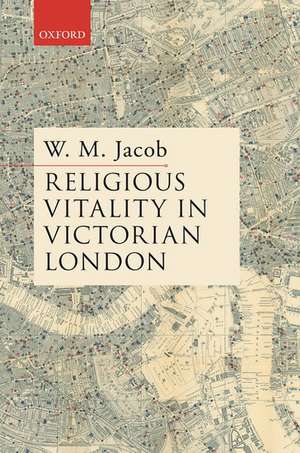Religious Vitality in Victorian London
Autor W. M. Jacoben Limba Engleză Hardback – 17 sep 2021
Preț: 616.31 lei
Preț vechi: 699.42 lei
-12% Nou
Puncte Express: 924
Preț estimativ în valută:
117.93€ • 126.11$ • 98.33£
117.93€ • 126.11$ • 98.33£
Carte disponibilă
Livrare economică 17-24 martie
Preluare comenzi: 021 569.72.76
Specificații
ISBN-13: 9780192897404
ISBN-10: 0192897403
Pagini: 368
Dimensiuni: 161 x 240 x 27 mm
Greutate: 0.7 kg
Ediția:1
Editura: OUP OXFORD
Colecția OUP Oxford
Locul publicării:Oxford, United Kingdom
ISBN-10: 0192897403
Pagini: 368
Dimensiuni: 161 x 240 x 27 mm
Greutate: 0.7 kg
Ediția:1
Editura: OUP OXFORD
Colecția OUP Oxford
Locul publicării:Oxford, United Kingdom
Recenzii
In this extensively researched study, Jacob has given us an extremely valuable overview of the state of religion in London during Queen Victoria's reign (1837-1901)...In many ways the work by scholars in this field runs parallel to what Jacob has accomplished in his Religious Vitality in Victorian London through his use of a wider concept of religion, with its emphasis on the social dimensions of religious faith in this period.
Overall, Jacob has provided an excellent survey of religion in London through a time of huge change. This book is a valuable source of information for anybody interested in the churches in nineteenth-century Britain, including London's influence spread across the country and beyond into the Empire. It demonstrates the continued power of faith in all areas of life and challenges the notion of a society becoming secularized. Nineteenth-century London was a highly religious city.
Jacob shows that the Church in London was committed to a "preferential option for the poor" a century before that maxim was coined - even though the well-off maintained a strict social distance from the destitute.
It will be an essential point of reference for future research on religion in the Victorian city and on Victorian cities more generally.
...given the book's very broad scope, some points will be open to debate, but it will be an essential point of reference for future research on religion in the Victorian city and on Victorian cities more generally.
Religious Vitality in Victorian London lays significant groundwork for renewed investigation into the many crosscurrents of religious thought informing all spheres of life in what Jacob convincingly portrays as an "extraordinary age of faith and philanthropy"
Overall, Jacob has provided an excellent survey of religion in London through a time of huge change. This book is a valuable source of information for anybody interested in the churches in nineteenth-century Britain, including London's influence spread across the country and beyond into the Empire. It demonstrates the continued power of faith in all areas of life and challenges the notion of a society becoming secularized. Nineteenth-century London was a highly religious city.
Jacob shows that the Church in London was committed to a "preferential option for the poor" a century before that maxim was coined - even though the well-off maintained a strict social distance from the destitute.
It will be an essential point of reference for future research on religion in the Victorian city and on Victorian cities more generally.
...given the book's very broad scope, some points will be open to debate, but it will be an essential point of reference for future research on religion in the Victorian city and on Victorian cities more generally.
Religious Vitality in Victorian London lays significant groundwork for renewed investigation into the many crosscurrents of religious thought informing all spheres of life in what Jacob convincingly portrays as an "extraordinary age of faith and philanthropy"
Notă biografică
W.M.Jacob is a Visiting Research Fellow at King's College London. He previously taught church history, focusing on the social history of religion, at Salisbury and Wells Theological College, Lincoln Theological College, and the University of Wales Lampeter. His books include Laypeople and Religion in the Early-Eighteenth Century (Cambridge University Press, 1996), The Clerical Profession in the Long-Eighteenth Century (OUP, 2007), and The Church in Wales from the Reformation to Disestablishment (University of Wales Press, 2007).
